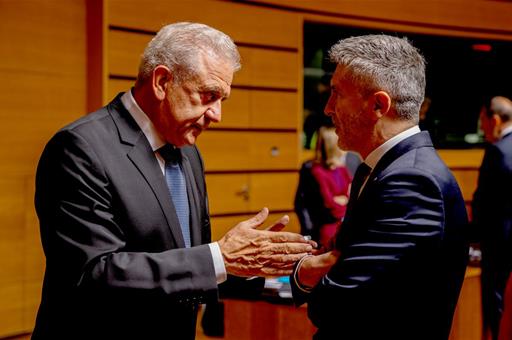In Luxemburg
Spain praises draft agreement to relocate migrants because it means European migratory policy is governed by principle of solidarity
News - 2019.10.8
Fernando Grande-Marlaska stated that Spain praises the draft agreement to relocate migrants among EU countries because "this starts to show traits of the principle of solidarity" which should prevail in our common policy on migration.
"We support the philosophy that underlines this agreement. This is a pilot project that will mean that European policy now moves down a path more in line with the guiding principles of the European Union", stated the Acting Minister for Home Affairs of Spain before mentioning in this regard Article 80 of the Treaty on the Functioning of the European Union, which proclaims the principle of "solidarity and fair sharing of responsibility among Member States".
Fernando Grande-Marlaska explained that this draft agreement "will start in the Central Mediterranean but will not lose the perspective of a single migratory policy since there is only one Mediterranean Sea".
In this regard, he argued before his European counterparts that this "should be inspired by a genuine common, global and structural policy on the matter of migration, borders and asylum", in other words, a policy that "involves all Member States", is applied "throughout the Mediterranean and to the African Atlantic Seaboard", and that is planned "for the medium and long term".
The Acting Minister for Home Affairs explained that the draft agreement for the relocation of migrants discussed at the meeting excludes the mechanisms for distribution to countries of first point of entry, such as Spain, Greece, Italy, Cyprus and Malta.
"It can be perfectly understood that Spain does not take on these relocations", said Fernando Grande-Marlaska, who highlighted at the meeting that "Spain has already demonstrated its solidarity" and that it is "responsible" by taking charge of rescues and landings on the African Atlantic Seaboard and in the Western Mediterranean, its control of the borders at Ceuta and Melilla and the fact that it has stepped up cooperation with countries of origin and transit.
Cooperation with Africa
The Acting Minister for Home Affairs also said that "the external dimension should not be neglected" in the phenomenon of immigration, and stressed the need and the positive results of fostering cooperation with countries of origin and transit, as on previous occasions to his European counterparts. He mentioned in this regard the example of Spain I it work to foster cooperation with such countries as Morocco, Algeria, Mauritania and Senegal.
"We must invest more in this area, and better and more positively coordinate with the countries of origin and transit", remarked Fernando Grande-Marlaska.
The meeting of the Justice and Home Affairs Council of the European Union also addressed other issues such as security and stability in the Sahel and how to better combat child abuse and sexual exploitation, an area in which Fernando Grande-Marlaska placed great emphasis on the need to "give international priority to the search for producers of material given the seriousness of their crimes and the harm this can cause".
The European ministers also discussed new technologies and their impact on domestic security. The Acting Minister for Home Affairs called, in this regard, for "a coordinated focus between all EU countries", and stated that Spain supports the creation of an Interpol innovation laboratory "to position the agency at the heart of innovation and at the forefront in security issues" related to the challenges of new technologies in this area.
Non official translation





